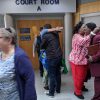FOR IMMEDIATE RELEASE
- A Scottish social scientist, who has been making sense of the up-and-down dynamics of the Cuba-Russia/Soviet Union relationship since the revolution, weighs in on the current deepening relationship between the two countries and its implications.
- A Cuban-American scholar, who studies the relationship between Cubans and Cuban Americans, analyzes the role of the Cuban diaspora in Florida.
- An American academic, who recently delivered a TED talk on the Cuban healthcare system, explains why the Cuban system has better results than its American or Canadian equivalents—despite spending a fraction of their costs.
- A Cuban economist analyzes the challenges facing the Cuban economy as the Trump administration applies increasing pressure, and future prospects.
- An American lawyer, a specialist in US laws regarding Cuba, explains the significance of the Helms-Burton Act.
- A Cuban-American social scientist examines the accomplishments and challenges of sexual diversity rights in Cuba for women.
- A Canadian scholar analyzes disaster preparedness in Cuba, and provides lessons in the post-Dorian world.
Mervyn Bain of the University of Aberdeen, Guillermo Grenier of Florida International University, Gail Reed of MEDICC, Antonio Romero of the University of Havana, Washington trade lawyer Bob Muse, María José Espinosa of the Center for Democracy in the Americas,and Emily Kirk are just a few among the 40 Cuba experts from around the world who will gather at Dalhousie University from Oct. 31–Nov. 2 to assess The Cuban Revolution at 60.
The academics will participate in a series of panels to assess the successes and challenges of the Cuban economy, Cuba-US relations and Cuba’s international relations. Other panels will focus on climate change and ecological challenges facing the island, as well as social change, including issues of race, gender (in)equity, health and sexual diversity.
The three-day symposium (October 31–November 2) will be highlighted by addresses by two of the key players in the historic 2014 re-opening of relations between Cuba and the United States. Josefina Vidal, now Cuba’s ambassador to Canada and then Cuba’s chief negotiator with the Americans, and Jeffrey DeLaurentis, the first US ambassador to Cuba following the renewal of relations, will each offer personal reflections on what happened then, and what isn’t happening now.
Dr. Alon Friedman, a ground-breaking neuroscientist at the Dalhousie University Brain Repair Centre who recently led a multidisciplinary study into the so-called “Havana Syndrome” for Global Affairs Canada, will also discuss his findings at the conference.
All sessions are open to the public, and free. For more information and to register: http://www.cuba60.ca
Contact:
• John Kirk (kirk@dal.ca)
• Media: (media@cuba60.ca)



